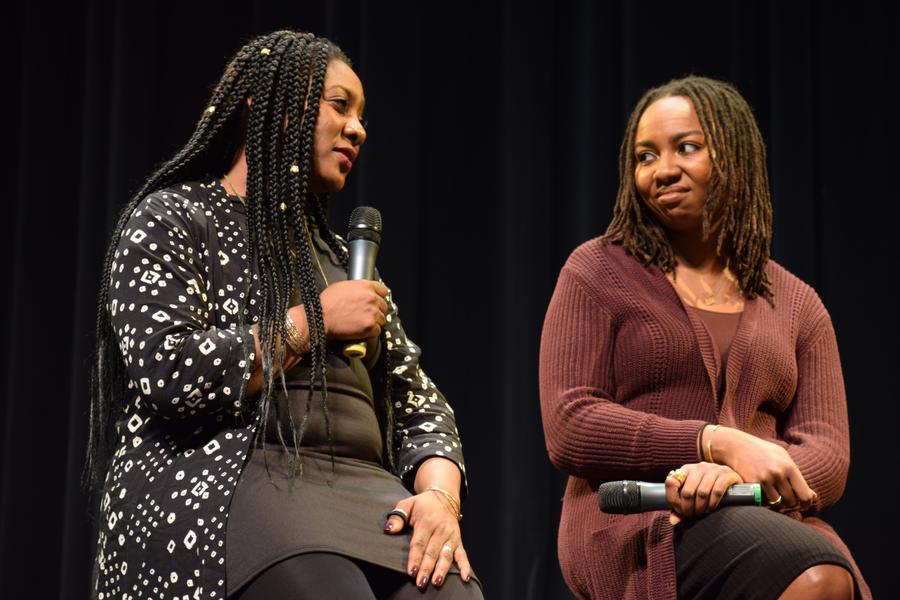
Two of the three creators of the BlackLivesMatter movement, Alicia Garza and Opal Tometi, took the Jesse Auditorium stage last night to educate an estimated 700 students, faculty and community members on the prominence of racial injustice.
BlackLivesMatter started after the fatal shooting of 17-year-old African-American Trayvon Martin in Sanford, Florida, on Feb. 26, 2012. His murderer, then 28-year-old white American shooter George Zimmerman was acquitted of second-degree murder July 13, 2013.
“It was a punch in the gut. I think it hit a lot of us personally,” Garza said. “Everybody has a word for black, and it is usually pejorative. We need black people, especially young black people, to not wear hoodies, to pull their pants up, to get a better education and deviate from the narrative that they didn’t start.”
Tometi said the movement is concerned with supporting a black consciousness rooted in embracing people in their entirety: their skin color and various identities beyond skin color.
“When we say Black Lives Matter, we are broadening the conversation around state violence to include all of the ways in which Black people are intentionally left powerless at the hands of the state,” the [Black Lives Matter website](http://blacklivesmatter.com/) reads. “We are talking about the ways in which Black lives are deprived of our basic human rights and dignity.”
Tometi said that though there are prominent African-American people such as President Barack Obama and Oprah Winfrey in society, the reality for many is brutality, surveillance and disenfranchisement from education and jobs.
“There are systems that are already connecting across the globe defining our lives and our place,” Tometi said. “Companies are making decisions about what to do with the workforce. We are made to fight for scraps. We are pit against one another. We have to lean into the connections we have as people who share a lot of history. We have to, as a movement, embrace that.”
Tometi and Garza spoke on collective care, recognizing, expressing appreciation for and checking in with one another. They spoke on the necessity of working to be so deeply rooted in each other’s struggles to prevent division among people.
“There are actual enemies that aim to make sure we don’t get the quality of life that we deserve,” Garza said. “We are not them. In between holding protest signs and all of that, we have to do the work to stay connected and in sync. We have different skills and beliefs and we need all of that.”
Tometi quoted African-American civil rights activist Audre Lorde, “There is no thing as a single-issue struggle because we do not live single-issue lives.”
People can’t deny that their intersections play a role in their particular experiences, Garza said.
“It’s not about identity politics, it’s about segregation in our democracy and in our society,” Garza said. “There is such a dialectic between culture and law; we can’t legislate our way out of racism because it’s so embedded in our culture.”
Garza said she doesn’t think the U.S. has ever been truly united; there has been a divide between the races since black people first came to America as slaves.
While it is important to recognize African-Americans’ historical roots as is done through Black History Month, Garza said it is more important for people to focus and act on ceasing current racial division.
In regard to [last semester’s protests](https://www.themaneater.com/special-sections/mu-fall-2015/) on racism and diversity at MU, Tometi and Garza said they were “in awe of the leaders (at MU) raising their voices.”
“We have deep appreciation for the folks who were a part of all of that,” Garza said.
Landon Jones, co-chairman of the Missouri Students Association and Graduate Professional Council speaker’s committee, said the event was scheduled last July and inviting Garza and Tometi to speak was not a reaction to last semester’s events.
BlackLivesMatter has 32 chapters internationally and been acknowledged in an episode of “Law & Order: SVU” about the Paula Deen racism scandal and the murder of Trayvon Martin.
Garza attributed the momentum BlackLivesMatter has gained to the fatal shooting of 18-year-old Michael Brown in Ferguson by Darren Wilson, a white police officer, in August 2014.
“A lot of people don’t know what the movement is about,” freshman Serena Stoddard said. “They hear about it and make their own conceptions about it. I had an idea of what it was about, but I came to learn more, so I can counter arguments from people who think this is just an anti-police or anti-white movement.”
Tometi and Garza spoke for 30 minutes and answered the audience’s questions for 90 minutes.
The event was sponsored by the MSA/GPC Department of Student Activities, Student Life, Gaines/Oldham Black Culture Center and the Chancellor’s Diversity Initiative. In honor of the movement’s roots in social media, the event included a BlackLivesMatter Snapchat filter.
_Edited by Taylor Blatchford | [email protected]_